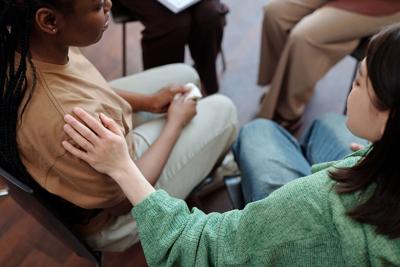
While life has many unknowns, one thing is for certain — at some point, we will all be impacted by death. Local organizations across Nashville are working to help people cope with the grief that comes with death and break stigmas around the grieving process.
One of those groups is Nashville Grief, which offers varying types of support for adults in the LGBTQ community. Services include free peer-led support groups and one-on-one care offered both in person and online. Krista Westervelt, who runs Nashville Grief, says the group not only helps people deal with the impact of death but also the grief that comes along with illness, disability and estrangement.
“There’s people who are grieving because they’ve lost family,” Westervelt says. “There are people who are newly out who are both celebrating the joys of being newly out and the losses related to it.”
Nashville Grief services are secular, and Westervelt says this nonreligious form of support is an important option to have in the LGBTQ community.
“Because of so much religious trauma around identity, some people have reasonably good religious experiences, but there has been so much of religion that’s been weaponized against the community,” says Westervelt. “Having a secular space feels safer psychologically, emotionally.”
Westervelt notes that Nashville Grief’s services are not a replacement for professional mental health counseling, but rather judgment-free places where grievers don’t have to explain their identities.
Says Alive Nashville’s Alissa Drescher, if kids are old enough to ask a difficult question, they deserve an age-appropriate answer
Alive, a nonprofit hospice in Nashville, also offers free grief services for children and adults, regardless of whether they had loved ones at the hospice. These include support groups and individual sessions with licensed counselors.
The organization creates loss-specific groups for people who have lost loved ones due to similar circumstances. Alissa Drescher, senior director of mission-based services at Alive, says this can be extremely helpful to those grappling with grief because they can often feel isolated in their experience.
Westervelt adds that loss-specific groups are a valuable resource to people who have lost loved ones to substance use.
”Having that space where you know you’re not gonna be judged for the manner in which they died, and people understand that that person was more than just the manner in which they died, is really helpful,” says Westervelt.
But group support isn’t for everyone. Art workshops can also provide a form of solace for grievers of all ages, Drescher says.
“I think when we get a piece of paper out in front of people and a couple of art materials, just something happens in the simplicity of that,” she says. “It brings us back to a very central and solid place, a more childlike perspective on life and on death, and it can open us up to exploring things that we didn’t know we even had in us.”
Alive also offers hiking programs, memorial services and workshops in writing and music, all tailored for people who approach their grief differently.
“I think the media depicts a grief group like a very sad circle of people sitting in chairs with tissue in between them,” Drescher says. “And don’t get me wrong, we do offer that, but the bulk of our services are considered strengths-based, and they’re multimodal. And what I mean by that is that we want people to connect and explore their loss in the way that they’re most comfortable.”
Percy Priest Elementary — the first school in Middle Tennessee designated a Grief-Sensitive School — tackles bereavement head-on
And for children, understanding grief is entirely different than it is for adults. Alive has several child-centered programs, including the annual Camp Forgot-Me-Not. Kristin Keiper-Berneman — a local school counselor and founder of Good Grieve Nashville who also led an effort to create a grief garden at Percy Priest Elementary School — has volunteered with the camp and says it helps children sit with their grief in doses.
“I find it wonderful for our community that it exists and is very healing,” Keiper-Berneman says.
No matter the situation, all grief experts agree: There’s no set formula to grieving, healing or understanding your emotions when someone has died. They all reiterate that grief isn’t linear, and there’s no “quick fix” or “magical cure.”
“Grief is a normal human experience,” Westervelt says. “It’s not a pathology. We don’t have to talk ourselves out of it. We can’t intellectualize our way out of it. It’s a very embodied, somatic experience.”
Exploring Nashville’s ghost tourism industry, chatting with a historian about the bodies buried in our state Capitol and much more








